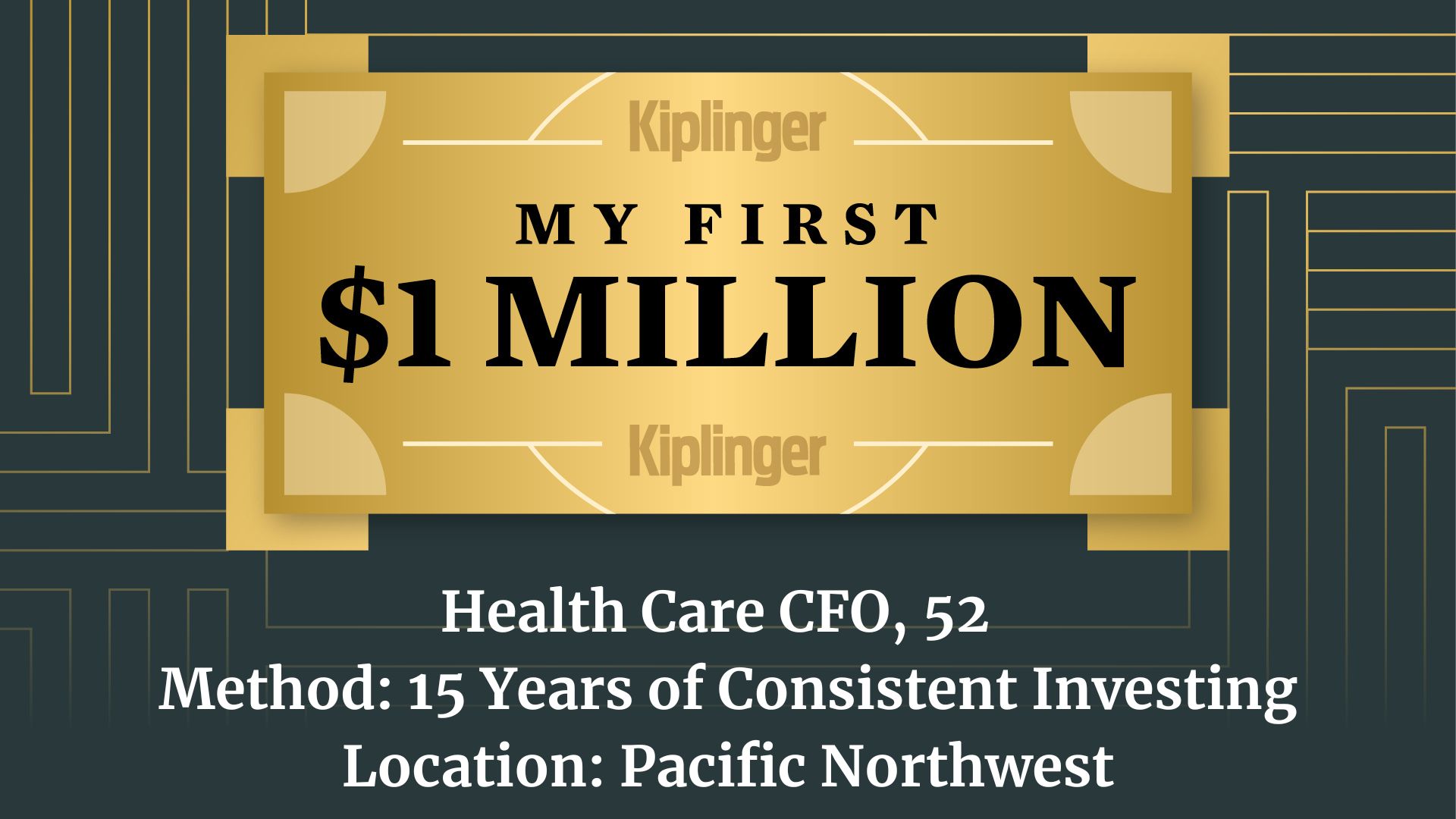Welcome to Kiplinger’s My First $1 Million series, in which we hear from people who have made $1 million. They’re sharing how they did it and what they’re doing with it. This time, we hear from a married 52-year-old health care chief financial officer in the Pacific Northwest.
See our earlier profiles, including a writer in New England, a literacy interventionist in Colorado, a semiretired entrepreneur in Nashville and an events industry CEO in Northern New Jersey. (See all of the profiles here.)
Each profile features one person or couple, who will always be completely anonymous to readers, answering questions to help our readers learn from their experience.
Sign up for Kiplinger’s Free Newsletters
Profit and prosper with the best of expert advice on investing, taxes, retirement, personal finance and more – straight to your e-mail.
Profit and prosper with the best of expert advice – straight to your e-mail.
These features are intended to provide a window into how different people build their savings — they’re not intended to provide financial advice.
THE BASICS
How did you make your first $1 million?
Consistent investing — roughly 25% to 30% of our gross income. It took us about 15 years to achieve the first million dollars in net worth.
Over the subsequent 15 years, our net worth has continued to grow to over $9 million. The strategy was simple — invest in yourself (your profession), save roughly 25% to 30% of your gross income and allocate it to low-cost ETFs and mutual funds.

(Image credit: Getty Images)
It took 25 years before I earned $1 million in any given year from my vocation and investment earnings. This achievement reflects continuous education, saying yes to stretch assignments and being willing to take risks professionally.
I learned more from the toughest roles and worst bosses that then led to new opportunities.
Take the time to invest in yourself!!! Your biggest asset is your knowledge, and no one can take that away from you.
What are you doing with the money?
Continuing the existing strategy of investing 25% to 30% of gross income. Taxes take a much bigger cut than you realize when earning income as an employee vs owning a business.
THE FUN STUFF
Did you do anything to celebrate?
Nope. There is an old saying that when you score a touchdown, act like you have been there before. If you have accumulated a million dollars, act like you have always had it.

(Image credit: Getty Images)
Does anyone know you’re a millionaire?
Don’t tell. However, if my kids (or their boyfriends/girlfriends) google me, they can find my income via public documents from some of my employers. Ultimately, my wealth doesn’t define who I am, so why tell anyone?
What is the best part of making $1 million?
Self-confidence. When I graduated from college, I had no net worth and earned $24,000 a year. I was able to:
- Build a net worth of $1 million in roughly 15 years
- Earn $1 million in 25 years
- Graduate to a net worth north of $9 million in 30 years

(Image credit: Getty Images)
Of course, I didn’t do all of this alone — I’ve been blessed to interact (work, mentor, etc.) with many individuals who made me better.
Did your life change?
Nope.
Any plans to retire early?
I don’t like the word “retirement.” (I think of it as) “preferment” — when I can do whatever I want to do professionally and personally.
Technically, I’m already there. However, I’m not planning to leave my profession — I love what I do.
You need to be engaged and feeling like you are contributing to your community. Idle hands are the devil’s workshop (Proverbs 16:27).
LOOKING BACK
Anything you would do differently?
Take advantage of the Roth IRA — and, while not available to me early in my career, the Roth 401(k). Allocate 100% to stocks.
Did you work with a financial adviser?
No. Financial advisers are extremely expensive. While a 1% fee seems small, it has a huge negative impact on overall returns. You can learn the basics, and if you keep a disciplined approach, you don’t need (to pay an adviser).
Some of the larger firms, like Fidelity, Charles Schwab and Vanguard, will give you access to some advisers for no charge. Use them to learn.
Did anyone help you early on?
My grandfather’s CPA. At the start of my career, I asked for advice about hiring a financial adviser. He told me not to do that.

(Image credit: Getty Images)
He stressed that I was smart enough to learn how to invest. He stressed educating myself and being disciplined. Great advice.
LOOKING AHEAD
Plans for your next $1 million?
Creating generational wealth.
Any advice for others trying to make their first $1 million?
Start early — invest in yourself and the market/business. Investing in yourself is the most important thing. Your education and skills are the foundation to your long-term success.
Never stop learning and growing. Being relevant makes you marketable.
Ultimately, this creates the income that will allow you to build net worth. Then invest your income/time into the financial markets and/or a business.
Do you have an estate plan?
Our estate plan is built around a legacy trust structure, split into four parts:
- 25% into a trust for each of our three children, where they may only receive income from the assets (limited to 3%), and those trusts will continue to support the next generation
- 6.25% to our church’s endowment
- 18.75% into our donor-advised fund to support health, education and those in need, with our children earmarking gifts annually
- When one of us passes, that spouse’s 50% share goes into an income trust to support the surviving spouse (what’s left of those funds when the surviving spouse passes will go to the children)

(Image credit: Getty Images)
We have a hunk-and-honey clause — my wife can remarry a hunk (I want her to be happy), but she can’t let my half of the estate go to the hunk or vice versa.
You also need to have a power of attorney and a health care directive — these are critical.
And for parents of college-age kids, get those same documents in place in case something happens while they’re in college. They are adults, and you need to have the documents so you can be an advocate if they need it.
Spending money on an estate plan is important, and you must keep it up to date.
What do you wish you’d known when you first started investing?
Your personal home is not an investment. There is no doubt that your home can increase in value.
However, homeownership has costs (repairs and maintenance), and ultimately, you can’t always predict when you’ll need to sell a home.
You can sell in a great market and make huge profits, or you can sell in a poor market and lose money.
We’ve made well over $100,000 on the sale of a home, as well as lost over $100,000 on the sale of a home. You can’t always control the timing of life’s needs.
What are you glad you know about retirement?

(Image credit: Getty Images)
No one talks about the need to develop a plan around how you will spend your time in a meaningful way.
I’m currently figuring out what my plan will be. Our vocations represent mental stimulation, social interaction and ultimately a purpose. You need a plan to continue to feel fulfilled.
If you have made $1 million or more and would like to be anonymously featured in a future My First $1 Million profile, please fill out and submit this Google Form or send an email to MyFirstMillion@futurenet.com to receive the questions. We welcome all stories that add up to $1 million or more in your accounts, although we will use discretion in which stories we choose to publish, to ensure we share a diversity of experiences. We also might want to verify that you really do have $1 million. Your answers may be edited for clarity.
RELATED CONTENT
TOPICS

